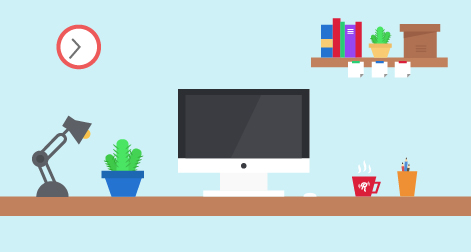Let’s face it, there’s really no 9–5 anymore. It’s easy to work from home at 2am, at least for my projects. Companies are heading further towards remote workstations and away from inflexible work hours.
Most of us are checking and responding to emails, writing presentations, or filling out paperwork way outside of normal working hours. Every night before I go to bed, I find myself checking the Facebook business profiles I manage and my work emails. I’m reachable pretty much all the time if someone needs me.
And I should probably say right now, I’m not the kind of person who likes structure. I love writing when I have inspiration, and when I don’t… you can pretty much forget it.
With that in mind, I’m really grateful that Resound is flexible with work hours. As a writer, I relish the quiet of home, compared to our sometimes lively co-working space. Nothing against collaborative work environments (I’m also a strong extrovert), but sometimes I need quiet to write creatively.
At Resound, if I need to work from home for a day because I have some heavy writing to do, or a doctor’s appointment, or the Phoenix valley is flooded, that’s perfectly fine.
Except…it’s not always perfect.
I’ll be honest…working from home is hard. And I suspect that I’m not the only one in on the interwebs who thinks so. I mean really, you’re sitting there with visions of tasks checked off and projects moving forward…when suddenly you remember, “Oh! The dishes really should be done.”
Or you’re in the middle of that bi-monthly report and you’re thinking, “I really should research that new apartment complex that opened up near me.”
Or your creative brainstorming session soon becomes a lot more cuddly and playful when your new kittens jump in your lap/your arms/all over your keyboard.
Very distracting.
Now, if you were at a physical office, these things would have a simple answer. “Later.” Obviously, you can’t do them at work. But at home…now that’s a different story.
This is a problem I’ve been trying to solve for a while now, and I’ve heard some great advice along the way. So for all you creatives like me who just need a little help, here are 3 ways to make your time at home more productive.
1. Create a Space
This might sound intuitive, but it’s so easy to forget. Make a space for yourself that is separated from the rest of your life. This might look like putting a desk in your bedroom or spare room, with the ability to close the door.
This is what made a huge difference for me. I can leave my kittens in the other room if they’re distracting me (this goes for dogs, children, spouses, etc.) As my father-in-law used to joke, “If this door is shut, you’d better be bleeding. That, or the house better be on fire.” Sounds like a pretty good plan to me.
Also, we humans are creatures of habit. Our brains easily recognize that certain spaces are associated with work, play, rest, etc. When you’re in your office at work, your brain goes into “work mode”, because it associates the space with that activity. We want to re-create this association at home.
2. Create a Structure
Now, I’ll be the first to admit that I’m not particularly fond of structure. However, I can see the need for it in this situation, and I envy those of you who do “structure” naturally. If I’m working from home, I try to get up at the usual time and structure my day just as I would were I in the office. We tend to throw our brains into a completely new situation and then wonder why they won’t focus like they do at work.
In the same vein, I’m convinced that the inside of my brain looks like the Space Cadet PC pinball game from the 90s, full of whirring sounds and flashing lights as my train of thought bounces around forcefully. Sometimes (like in brainstorming situations) this is very helpful. Other times…not so much. When the random “Oh I need to do _____” hits, just exert some good old-fashioned willpower. Sometimes I go so far as to say (out loud), “Does this have anything to do with work? No? Later.”
This is not easy, but I notice less hours melting away into oblivion when I take conscious control of it.
3. Create a Schedule
I don’t know about everyone else, but I’m a very project-driven individual. If it has to be done, I’ll do whatever it takes to get it done – even if it takes me all night. (Yes, I was that college student working on the next day’s presentation till 2am…but really…who wasn’t?)
Point is, if I know what needs to be done, I’m all over it. So I create “important projects” for my days working at home. This way, I’m not aimlessly shuffling through projects for my next task (and then getting distracted when I find none imperative enough). I’ll even overload my schedule (more than I know I can do in one day) to re-create the urgency of a project due. Obviously, I may not get everything done, but I can try. It’s a baseline – a foundation that keeps me engaged in my tasks longer.
Kick Butt
Set up the framework you need to make the most of your time.
Maybe you work at home completely differently! What are your tips for working at home?





